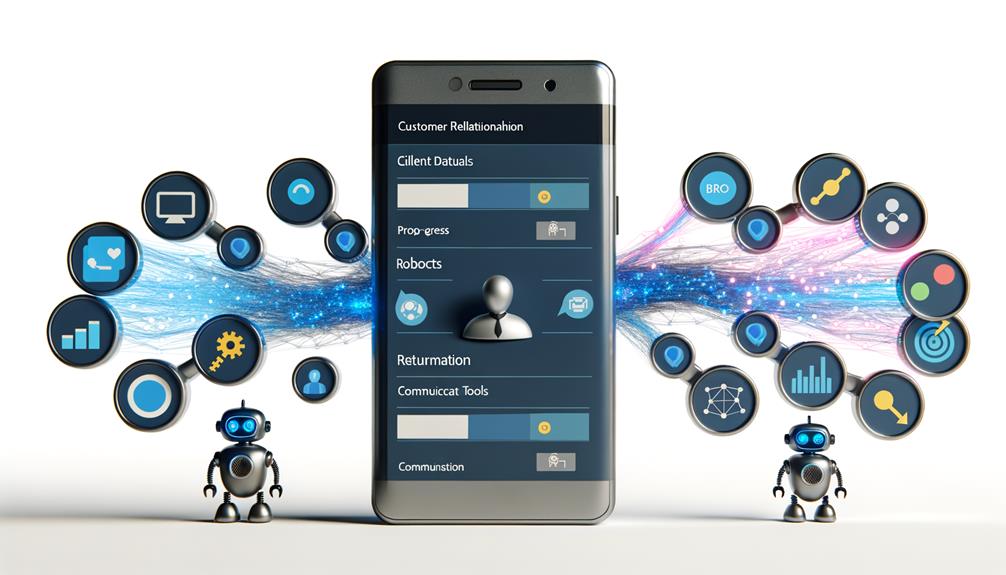AI is reshaping CRM dramatically, particularly in customer segmentation. Through AI, you're equipped to target leads likely to convert, delivering personalized campaigns that boost engagement. AI's power in recognizing and grouping customer types based on data patterns lets you create marketing strategies tailored to specific groups. Striking a note with carefully segmented customers aids in better engagement and loyalty. As you journey further into the intriguing and dynamic world of AI-enhanced CRM, you stand to uncover more nuggets that will place you strides ahead in strategic customer relationship management.
Understanding AI in CRM

To fully appreciate the revolution taking place in customer segmentation, you'll need to understand how AI is transforming CRM systems, automating tasks and decision-making for unparalleled efficiency and precision. AI-powered CRM platforms are not just time-savers but also predictors, identifying leads likely to convert into customers, thereby streamlining your marketing strategies. They're designed to deeply understand customer behavior, allowing you to tailor your campaigns more effectively for increased engagement and loyalty. These AI algorithms can also identify new customer segments unseen in traditional methods, enabling personalized marketing messages. Additionally, AI in CRM simplifies data analysis, providing actionable insights for more effective product marketing campaigns. AI is redefining customer segmentation in CRM, offering a paradigm shift towards data-driven marketing.
AI-Powered Customer Segmentation

Shifting our focus to AI-powered customer segmentation, you'll see that it's an advanced tool using machine learning algorithms for precise customer categorization. This innovative approach adds an edge to traditional customer segmentation techniques. Let's break it down:
- AI algorithms analyze behavioral, transactional, and psychographic data, going beyond conventional customer data analysis.
- Real-time dynamic grouping of customers based on evolving data patterns is possible.
- Predictive analytics enable anticipation of customer behavior and preferences.
- Tailored marketing strategies are developed using AI-driven customer segmentation.
- Personalized marketing campaigns become more efficient and informed, enhancing decision-making.
This tech-savvy approach to segmentation enhances personalization, making it a powerful tool for businesses aiming to understand and meet their customers' needs.
The Process of AI Segmentation

In understanding the process of AI segmentation, you're getting to grips with how machine learning algorithms can be applied to analyze customer data. You'll see how this technique can identify new customer segments that might have been missed by traditional methods. It's a complex process, but one that can ultimately help you tailor marketing messages to specific customer groups, optimizing your CRM personalization strategies.
AI Segmentation Techniques
Harnessing the power of machine learning, AI segmentation techniques analyze your customer data, identifying commonalities and patterns that enable the creation of distinct, targeted customer groups. This powerful tool uses machine learning algorithms to:
- Analyze large amounts of customer behavior and preference data.
- Create customer segments based on identified patterns.
- Inform tailored marketing strategies and targeted campaigns.
- Offer personalized content to each customer segment.
- Enable businesses to make informed decisions for better resource allocation.
With AI Customer Segmentation, you can reach your customers with precision and relevance. By understanding the unique characteristics of each segment, your marketing efforts become more efficient and effective, ensuring customer engagement and loyalty. AI segmentation techniques are indeed a game-changer in CRM.
CRM Personalization Strategies
Diving into CRM personalization strategies, you'll discover that leveraging AI segmentation is a game-changing approach for creating targeted marketing campaigns based on your customer data. This process allows you to understand customer behavior and preferences, leading to personalized interactions.
AI segmentation collects and analyzes data to identify distinct customer segments, tailoring your products and services to meet specific customer needs. This approach not only enhances customer engagement but also fosters loyalty and satisfaction.
Below is a snapshot of how AI segmentation enhances CRM personalization:
| CRM Personalization | AI Segmentation |
|---|---|
| Understands customer behavior | Analyzes data |
| Personalizes interactions | Identifies customer segments |
| Creates targeted marketing campaigns | Tailors products & services |
| Uses customer data | Enhances customer engagement |
| – | Fosters customer loyalty |
Benefits of AI in CRM

Utilizing AI in your CRM system can greatly enhance customer satisfaction by enabling personalized interactions and providing tailored solutions. It's not just about improving efficiency; AI takes CRM to a new level by offering:
- Predictive analytics: AI can predict customer behavior, allowing for efficient resource allocation.
- Targeted marketing campaigns: AI helps in segmenting customers, making your campaigns more effective.
- Increased engagement: AI optimizes customer experiences, leading to higher engagement.
- Actionable insights: AI-driven CRM provides data that informs decision-making.
- Enhanced customer lifetime value: By understanding customer preferences, AI can help increase their lifetime value.
In essence, AI in CRM is revolutionizing customer segmentation and satisfaction, leading to a more profitable and customer-centric business.
AI-Driven Personalization Strategies

As we move forward, let's consider how AI-driven personalization strategies can enhance your CRM implementation. Imagine utilizing AI-powered targeting techniques to analyze massive data sets, predicting individual customer needs, and tailoring experiences accordingly. This level of personalization not only elevates customer satisfaction but can also lead to significant increases in conversion rates and revenue growth.
AI-Powered Targeting Techniques
In today's tech-driven world, you can leverage AI-powered targeting techniques to analyze customer data, enabling you to craft personalized marketing strategies that resonate with specific customer segments. By using machine learning algorithms, AI allows you to:
- Create tailored messages and offers based on identified patterns in customer behavior and preferences.
- Use these insights to plan effective marketing campaigns that engage your audience.
- Optimize your resource allocation by focusing your efforts where they're most likely to yield returns.
- Improve customer satisfaction by providing personalized experiences that meet their unique needs and expectations.
- Achieve AI-driven customer segmentation, segmenting your audience into distinct groups for more precise targeting.
These techniques take customer relationship management to the next level, empowering you to drive better business outcomes.
Personalization in CRM Implementation
Harnessing the power of AI, your CRM can now deliver highly personalized customer experiences using machine learning algorithms to analyze and adapt to individual customer behavior in real-time. This AI-driven personalization in CRM implementation tailors marketing messages to individual preferences and interactions, dynamically adapting to changing data for targeted promotions and personalized recommendations.
Moreover, the benefit? Improved customer engagement and loyalty. Your customers receive content and offers that resonate with them, fostering a connection with your brand. Additionally, the AI capabilities of your CRM don't just react to customer behavior – they predict it. By understanding past purchase history and customer interactions, your CRM can anticipate future behavior, ensuring your marketing messages hit the mark every time.
Potential Challenges in AI Segmentation

While AI segmentation offers transformative possibilities for customer relationship management, it's not without its challenges, namely algorithm bias and data quality concerns. These issues can greatly alter the accuracy of your customer segmentation, skewing your targeted marketing campaigns.
To create a vivid image, consider these potential pitfalls:
- Algorithm bias can distort outcomes, requiring ongoing monitoring and adjustments to guarantee accuracy.
- Data quality is paramount; outdated or irrelevant data will adversely affect AI algorithms.
- AI segmentation hinges on the constant upkeep of data quality.
- Tools like Mailchimp can help mitigate these challenges, but they are not silver bullets.
- Even with these tools, the inherent complexities of AI algorithms may present unforeseen obstacles.
Understanding these challenges will better equip you to navigate the world of AI segmentation.
Overcoming AI Segmentation Pitfalls

Overcoming AI segmentation pitfalls is an important step in optimizing your CRM. To commence this, you need to address data quality, monitor for biases in outcomes, and utilize tools like Mailchimp for efficiency. Remember, your data must be clean, current, and relevant to guarantee effective AI segmentation strategies.
Identifying AI Segmentation Challenges
In tackling the challenges of AI-driven customer segmentation, you'll first need to address the crucial issue of data quality to guarantee accuracy in your outcomes. This involves:
- Monitoring and addressing data quality concerns
- Continuously updating data to maintain its relevance
- Cleaning data to eliminate inaccuracies
- Mitigating algorithm bias through regular adjustments
- Utilizing tools like Mailchimp for precision targeting
These actions can help to prevent accuracy issues in AI-driven segmentation, ensuring that your targeted marketing campaigns hit the mark every time. But remember, overcoming AI segmentation pitfalls is a continuous process. It requires a commitment to providing clean, up-to-date, and relevant data, as well as the knowledge and expertise to address any potential bias in your algorithms.
Implementing Effective AI Solutions
Exploring the complexities of AI segmentation pitfalls, it's crucial that you maintain a vigilant eye on data quality, as it directly impacts the accuracy of your algorithms. When using AI for customer segmentation, data quality concerns can lead to algorithm bias, skewing your targeted marketing campaigns and hindering personalized experiences. To overcome this, make certain your data is clean, up-to-date, and relevant. Continually monitor and adjust your AI solutions to mitigate bias and improve segmentation outcomes. Tools like those offered by Mailchimp can streamline this process, enhancing the precision of your customer targeting. Remember, effective implementation of AI segmentation is a dynamic process, requiring constant vigilance and adjustment to deliver the best results.
Real-life AI Segmentation Examples

While you might think AI-driven customer segmentation is a thing of the future, several prominent companies are already leveraging this technology to enhance their customer relationship management. Here are a few real-life examples:
- Coca-Cola, using AI for customer segmentation, delivers personalized marketing campaigns to improve customer engagement.
- Amazon harnesses AI algorithms for customer segmentation, tailoring product recommendations based on user behavior.
- Sephora utilizes AI in customer segmentation, offering personalized beauty recommendations for an enhanced shopping experience.
- Uber applies AI-driven segmentation to target specific customers with personalized promotions, boosting user retention and satisfaction.
- Burberry uses AI technology for customer segmentation, providing personalized content and offers, leading to higher conversion rates and brand loyalty.
These instances demonstrate the transformative power of AI in personalizing and improving customer interactions.
Future of AI in CRM

As we look towards the horizon, you'll find that the future of AI in CRM is bursting with potential, poised for substantial growth, and brimming with opportunities for enhanced customer engagement. This growth, driven by a yearning for hyper-personalization and enhanced customer experiences, is predicted to catapult business revenue to an astounding $1.1 trillion globally by 2025.
The key lies in the seamless integration of AI in CRM systems. Armed with real-time data processing and predictive analytics, these systems can anticipate customer needs and craft personalized interactions. The result? A potential 15% increase in revenue and a 20% decrease in customer service costs. Clearly, the future of AI in CRM promises a revolution in meeting and exceeding customer expectations.
Choosing Effective AI Tools

When it comes to choosing effective AI tools for your CRM system, it's important to select ones that can adeptly analyze and interpret customer data. These tools are invaluable in providing insights into customer behavior and for crafting targeted marketing strategies.
Consider the following when making your selection:
- AI tools that offer predictive analytics. This allows you to anticipate customer needs and desires.
- Tools with segmentation capabilities. This aids in creating personalized marketing campaigns.
- Machine learning algorithms for real-time and dynamic segmentation.
- AI tools that provide actionable insights. These can be used to develop targeted marketing strategies.
- Tools that allow for a thorough analysis of customer data.



